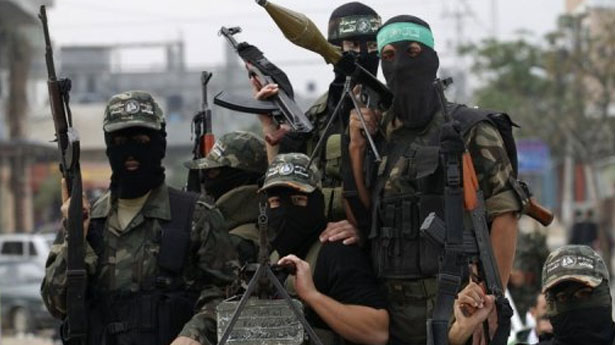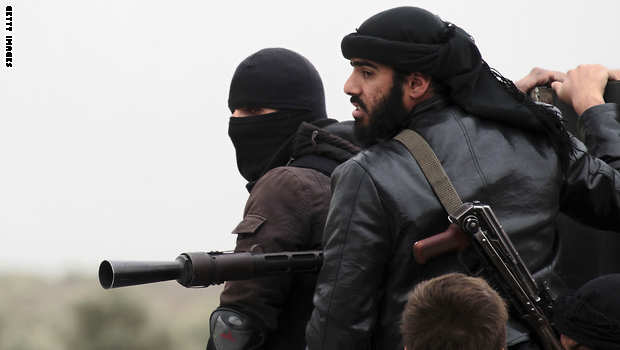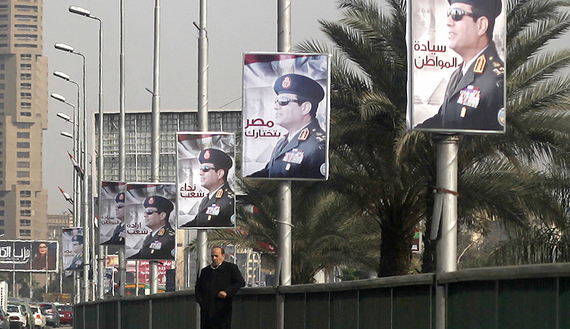
Experts who examined the sickening footage of ISIS militants killing Christians in Libya say the tape was doctored with. In the above still, the killers appear to be more than 7 feet tall.
Video of 21 Egyptian Coptic Christians being marched along a Libyan beach before being beheaded by black-clad members of ISIS is hard for any civilized person to watch, but experts who made it through the sickening, five-minute clip told FoxNews.com Friday they came to the same conclusion: The footage was faked.
No one holds out hope the victims, mostly poor fishermen who had gone to Libya to scratch out a living, are still alive. But several anomalies in the video, which was posted online Feb. 15, indicated to trained eyes that at least some of the production was done on “green screen” with background added later, perhaps to disguise the real location of the atrocity. A day after the clip went viral, Egyptian warplanes struck hard at an eastern port city near Tripoli, where the video appeared to have been shot.
“The Islamic State’s manipulation of their high-production videos has become commonplace,” said Veryan Khan, editorial director of the Florida-based Terrorism Research & Analysis Consortium. The murders likely took place in a studio, and the background image shown was likely from another location, the Bay in Sirte, a part of the Mediterranean Sea on the northern coast of Libya, according to Khan. There are several technical mistakes in the video that show it was manipulated, she said.
The most obvious, Khan said, is the speaker, “Jihad Joseph” is much larger than the sea in both the close up and wide shots, and his head is bizarrely out of proportion, meaning he was filmed indoors and the sea added behind him, Khan said. In addition, the jihadists featured in the film look to be more than 7 feet tall, towering as much as two feet above their victims.
The perspective is something several Saudi Arabians noted in their tweets about the video, questioning whether the jihadists were a part of some sort of special forces unit since they were so large.
Hollywood horror film director Mary Lambert, who among her many film credits directed Pet Cemetery, analyzed the film for FoxNews.com and quickly concluded Khan was correct.

Turning the sea red is a grisly effect, but one which would actually take much more than the blood of 21 men, according to experts.
“The shot that seems really tampered with is the one with the really tall Jihadists and the dwarf Christians,” said Lambert, also a professor at New York University’s vaunted film school. “The close-ups of Jihadists on the beach are most likely green screen.”
Other technical giveaways: The sound of the ocean is likely a well-known audio track. Even more bizarre, the stream of blood in the ocean at the end of the video, and during the beheading of the final victim, is most likely not real. TRAC’s forensic analyst said turning the sea red is the “cheapest and easiest post-production tool” and “can even be achieved with a cell phone.” But doing it in the manner portrayed in the video is actually impossible, Khan said.
The sea turning red is obviously “FX”, Lambert agreed, with special computer effects used.

The man identified as “Jihad Joseph” may be an American, according to some analysts who have scrutinized his accent.
“I think that in the opening shot all the figures might be animated. They never had more than six men on the beach,” Lambert said.
The directors of the video used animation and “rotoscoping” to use the six figures like a rubber stamp in the marching sequence and also in the kneeling sequence, Lambert said.
Rotoscoping is a visual effect where the image is manually removed from a background in a live action video, and then composited on a different background, usually with green screens and chroma key.
“The weird jump-cut editing in the opening is a way to conceal this,” Lambert said.
There are shots that pan the prisoners on the beach and tilt down to the kneeling that look real to Lambert, although she added they “might have been enhanced in some way.”
The most amateur mistake, according to Khan’s forensic analyst, is getting the perspective along the shoreline all wrong.
“What is supposed to be the seashore is, in reality, a bay as determined by the tide, rocks, and wave action. Looking at the two big sets of footprints in the sand shown at a 90- degree angle, neither set of footprints can be the hostages or the hostage takers. Had this been a seaside shot, the sand would have been much softer and the victims’ footprints would have sunk much deeper into the sand,” the forensic analyst reports.
Another mistake was made during the beheading of the final victim, Khan said.

Experts who analyzed the footage believe the men were killed elsewhere, possibly in a studio.
“Not only did it lack the correct blood pulsation for decapitation, but seems to have had the blood ‘faked’ with cornstarch,” Khan said.
As human blood oxygenates, it darkens, Khan said, adding because this blood did not, it exposes the possibility that the beheadings were not done at the same time, despite ISIS’s claims.
Why all the bizarre video manipulation?
“Islamic State has been revolutionary in using the green screen technique, most likely to limit exposure to drones [and] satellite [locating of] their operations,” Khan said. “The producer probably required that only the cameraman and his assistant be present for the outdoor frames. Later, in post production, the editors dropped in the executions.”
The Islamic State is notorious for its high-quality productions of horrific murders such as children learning to execute victims, suspected gays being thrown from buildings and the burning alive of Jordanian air force pilot Moath al-Kasasbeh, but this video was produced by a much less talented ISIS crew, Khan said.
FoxNews.com provided TRAC’s analysis to the CIA, where a spokesperson said the matter was under review. The agency is among the intelligence bureaus already pouring over the footage to determine the identity of “Jihad Joseph,” who leads the mass beheading depicted on the video and who some have speculated may be an American.
Egyptian government officials did not respond to requests for comment, but Edward Yeranian, an Egypt-based radio correspondent for Voice of America and other news agencies, said Egyptian analysts are also openly skeptical about the video’s authenticity.
“Even the number of people beheaded is still in dispute,” Yeranian said.




















